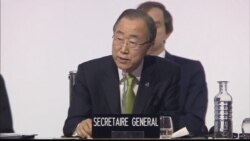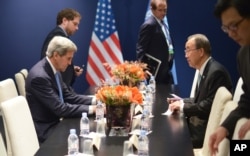ຄະນະເຈລະຈາທີ່ໄປເຕົ້າໂຮມກັນຢູ່ກອງປະຊຸມວ່າດ້ວຍດິນຟ້າ
ອາກາດ ທີ່ມີການຄອງຄອຍຖ້າ ມາເປັນເວລາດົນນານແລ້ວນັ້ນ
ໄດ້ນຳອອກເຜີຍແຜ່ຮ່າງຂໍ້ຕົກລົງຂັ້ນສຸດທ້າຍກ່ຽວກັບແຜນການ
ສຳຄັນ ເພື່ອເຮັດໃຫ້ສະພາບອາດຮ້ອນເອົ້າຂອງໂລກຊ້າລົງ ລຸນ
ຫລັງການເຈລະຈາຢ່າງຂຸ້ນຂ້ຽວເປັນເວລາເກືອບສອງອາທິດ.
ຮ່າງຂໍ້ຕົກລົງທີ່ນຳອອກເຜີຍແຜ່ໃນຕອນເຊົ້າວັນເສົາມື້ນີ້ຍັງຈະ
ຕ້ອງໄດ້ຮັບການອະນຸມັດ ຂັ້ນສຸດທ້າຍ ຈາກພວກຜູ້ແທນຂອງ
190 ກວ່າປະເທດທີ່ເຂົ້າຮ່ວມກອງປະຊຸມແຕ່ພວກນັກການທູດ
ຄາດວ່າຈະມີຂຶ້ນໃນຕອນບ່າຍຂອງມື້ນີ້.
ດ້ວຍການປະກາດວ່າຂໍ້ຕົກລົງວ່າດ້ວຍດິນຟ້າອາກາດເປັນບາດລ້ຽວປະຫວັດສາດ ທ່ານ
Laurent Fabius ລັດຖະມົນຕີການຕ່າງປະເທດຝຣັ່ງ ກ່າວວ່າ ຂໍ້ຕົກລົງດັ່ງກ່າວ ຈະຈຳ ກັດຄວາມຮ້ອນເອົ້າຂອງໂລກ ໃຫ້ຕ່ຳກວ່າສອງອົງສາແຊລເຊີສ ແລະບາງ ທີອາດຈະຕ່ຳ
ເຖິງ 1.5 ອົງສາກໍເປັນໄດ້.
ນອກນັ້ນແລ້ວ ທ່ານ Fabius ຍັງກ່າວວ່າ ເອກກະສານດັ່ງກ່າວ ຈະມີຜົນບັງຄັບທາງກົດ ໝາຍແລະມີກຳນົດທີ່ຈະທົບທວນພາຍໃນເວລາຫ້າປີແຜນການຂອງຊາດເພື່ອຫລຸດສະ
ພາບອາກາດຮ້ອນເອົ້າ. ທ່ານເວົ້າວ່າ ໃນນັ້ນແມ່ນຈະຮວມທັງເງິນສະໜັບສະໜຸນປະຈຳ
ປີເພື່ອຮັບມືກັບການປ່ຽນແປງຂອງດິນຟ້າອາກາດຢ່າງນ້ອຍ 100 ພັນລ້ານໂດລາສຳລັບ
ປະເທດທີ່ກຳລັງພັດທະນາ.
ທ່ານ Ban Ki-moon ເລຂາທິການໃຫຍ່ອົງການສະຫະປະຊາຊາດກ່າວຕໍ່ຄະນະຜູ້ແທນ
ທີ່ເຂົ້າຮ່ວມກອງປະຊຸມດິນຟ້າອາກາດກ່ອນທີ່ພວກເຂົາເຈົ້າຈະພົວພັນນຳການອະພິປາຍ ແລະການລົງຄະແນນສຽງ ເພື່ອຮັບຮອງເອົາ ຮ່າງຂໍ້ຕົກລົງນັ້ນວ່າ ຈຸດສຸດທ້າຍແມ່ນແນມ
ເຫັນແລ້ວ ຂໍໃຫ້ພວກເຮົາຈົ່ງສຳເລັດເສັດສິ້ນວຽກງານດັ່ງກ່າວ ໃນເວລານີ້. ໂລກທັງໂລກ
ກຳລັງຈັບຕາເບິ່ງ. ຫລາຍໆພັນລ້ານຄົນແມ່ນກາງຕໍ່ ການຕັດສິນໃຈ ຢ່າງສະຫລາດສ່ອງ
ໃສຂອງທ່ານ.
ທ່ານ Ban ກ່າວຕື່ມວ່າ ເວລາໄດ້ມາເຖິງແລ້ວເພື່ອຮັບຮູ້ວ່າຜົນປະໂຫຍດຂອງຊາດແມ່ນຈະດີກວ່າໂດຍດຳເນີນການ ເພື່ອເຫັນແກ່ຜົນປະໂຫຍດຂອງໂລກ ແລະຄວາມເປັນເອກກະພາບກັນ.
ປະທານາທິບໍດີຝຣັ່ງ ທ່ານ Francois Hollande ກໍໄດ້ຊຸກຍູ້ໃຫ້ຄະນະຜູ້ແທນຕ່າງໆສະ ໜັບສະໜຸນເອກກະສານດັ່ງກ່າວ ຊຶ່ງທ່ານເວົ້າວ່າ ຈະເປັນການກະທຳ ທີ່ສຳຄັນສຳລັບມະນຸດຊາດ.
Negotiators at a long-awaited climate conference in Paris have released the final draft of an ambitious plan to slow global warming, following almost two weeks of strenuous negotiations.
The text released early Saturday still must receive final approval from the delegates of the over 190 nations gathered at the conference, but diplomats expect that to come as early as later in the afternoon.
If approved, the proposal could represent a major breakthrough in a decades-long global attempt to curb emissions of fossil fuels that scientists say are causing global temperatures to rise dangerously.
The pact attempts to balance the interests of richer, developed nations and poorer, developing countries, many of which have insisted they should not be held to as high an environmental standard.
There were also lingering questions about how to verify the agreement, which is not legally binding.
On Friday, talks were extended an extra day as teams from 196 countries aim to reach the most wide-ranging climate deal since the 1997 Kyoto protocol, this time involving not only industrialized nations, but also developing countries in a global effort to deal with climate change.
At the time, U.S. Secretary of State John Kerry said a lot of progress has been made at the U.N. climate talks in Paris, but some "very difficult" issues must be resolved.
Optimism
Kerry met Friday with French Foreign Minister Laurent Fabius after what sources said was a hard night of negotiations among the 195 nations at the Paris meetings.
Fabius said he was optimistic for an agreement.
"All the conditions are there for us to reach a universal, ambitious agreement," said Fabius. "Now it's the ministers' responsibility to make their choice tomorrow [Saturday]."
U.N. Secretary General Ban Ki-moon described the talks as "extremely difficult" as he urged delegates to put aside national concerns for the good of the entire planet.
"This is not a moment for talking about national perspectives. Good global solutions will help good local solutions," said Ban.
The biggest disagreements have been over how much financial responsibility poorer nations should take in the cost of emissions-cutting measures, and what the stated long-term goal should be for the agreement.
But a Chinese representative said the deal should have different rules for different countries, calling the demand "quite legitimate" if some populations want to maintain a certain lifestyle.
Global temperatures
Earlier world climate conferences had set a goal of keeping the rise in global temperatures this century to two degrees (Celsius) above worldwide levels before the industrial era started.
However, newer research has indicated that a lower target – such as limiting the rise in temperatures to 1.5 degrees – would be preferable.
Island nations contend that the rise in sea levels triggered by higher global temperature puts at risk their very existence.







